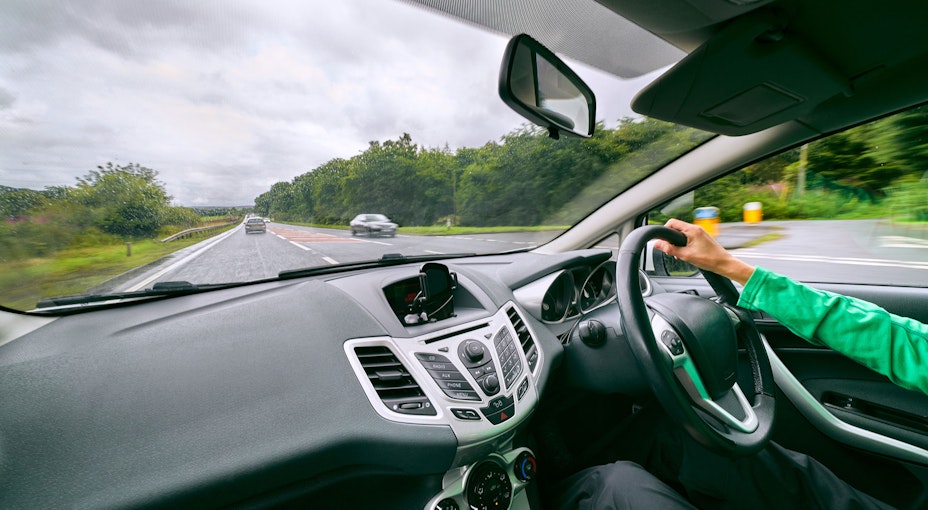What is ghost broking? A UK guide to spotting and avoiding insurance fraud
Ghost broking is one of the fastest-growing car insurance scams in the UK, which can leave victims thousands of pounds out of pocket. It occurs when fraudsters target drivers seeking affordable deals, particularly younger motorists aged 17–29, and sell them fake or invalid car insurance policies.
22.10.25
By
![]() Clare Waring
Clare Waring

The consequences of falling victim to a ghost broker are severe. Drivers can end up uninsured, fined, or even have their vehicle seized. Worse still, the Insurance Fraud Bureau warns that cases of this kind of motor insurance fraud are on the rise. Between 2023 and 2025, ghost broking scams increased by 50%, largely driven by vulnerable drivers being targeted on social media.
We take a look at how to spot a ghost broker, how their scams work, and give you tips on protecting yourself when buying private car insurance.
How to spot a ghost broker
When you buy car insurance, your insurer assesses your risk. If you are a younger driver or you have previous motoring convictions, you’ll be considered a higher risk than experienced drivers with clean records. This is why premiums for younger drivers are more expensive.
Ghost brokers target these groups who face the highest insurance premiums. By offering a lower-priced alternative, they lure you into buying a fake or invalid product that not only leaves you uninsured but also exposes you to prosecution and the risk of your car being seized or destroyed.
For that reason, be particularly vigilant when buying car insurance. Telltale signs that you’re dealing with a ghost broker include:
Unrealistically cheap quotes. If a deal looks too good to be true, it almost certainly is. If a quote is drastically cheaper than the others you’ve got, then it’s a major red flag.
Brokers who only communicate via messaging apps or social media. Channels like WhatsApp, Snapchat, or Facebook enable scammers to remain anonymous. Genuine brokers use official communication channels and professional email addresses; therefore, be aware that scammers may also use fake email addresses.
Asking for payment via bank transfer. Never send money via bank transfer. No legitimate broker will ask you to do so.
Advertising through unusual channels. Be cautious of adverts posted on student forums, social media groups, or noticeboards in pubs, colleges, or newsagents. Also, be particularly wary of anyone you meet in bars or clubs who claims to be a broker.
They avoid giving you clear business details. If a ‘broker’ won’t share the name of their firm or its address, don’t deal with them.
They aren’t registered with the Financial Conduct Authority (FCA). If you can’t find the company they claim to represent on the FCA’s register, they may be a scammer.
How to protect yourself
The best defence against ghost broking is vigilance. Follow these simple checks before you buy any car insurance policy.
1. Ask for the broker’s FCA registration number.
Every authorised insurance broker or insurer must have a Financial Conduct Authority Firm Reference Number (FCA FRN). If they can’t provide it, they’re not legitimate. Even if they do, you need to make sure it’s valid.
2. Check the Financial Services Register
By law, anyone carrying out ‘regulated activities’, which include arranging insurance, must be authorised and registered by the Financial Conduct Authority. If they aren’t, they can be imprisoned and fined.
Therefore, the single most important thing you can do to verify a broker is legitimate is to check the FCA’s financial services register.
To use the register, type in the name of the firm you want to check. If you are presented with a list of companies with similar names, you should select the one with the correct registration number. You can then select the type of product you want to buy. The system will indicate whether the company is authorised to sell it to you. You should also make sure that the FCA has authorised the company for the activity they are promoting; for example, if they’re only authorised for credit, they can’t advise on insurance or investments. The FCA refer to this as the “halo effect”, where a firm’s FCA-regulated status gives a misleading sense of safety for its other, unregulated activities.
Be extra vigilant if you see this warning notice on the company’s profile on the FCA register.
Stay alert for clones of this firm.
This is a genuine firm. But scammers have copied its details to try and convince people to use their fraudulent firms. These are known as clone firms.
You can help protect yourself, and check you’re dealing with the genuine firm, by only contacting them on their officially registered phone number.
Check our Warning List to find details about known clone firms.
Even if you don’t see a warning message, it’s smart to check out the warning list. At the time of writing, it lists 16,524 unauthorised firms and individuals that aren’t allowed to operate in the UK. If a firm is listed as authorised, always follow the advice above and only use its officially registered phone number.
3. Use reputable websites
If you buy insurance online, only use reputable websites. Don’t trust website links sent to you via social media or messaging apps. If you are unsure whether a website is genuine, phone the insurer on the number it has registered with the FCA. Be particularly alert for URLs that appear to be official but use slightly different characters or letters. The same advice goes for email addresses.
What are the consequences of using a ghost broker?
If you buy a fake or invalid policy, you are effectively driving uninsured. This is a criminal offence, even if you weren’t aware you were uninsured. If you are caught, you could face:
A £300 fixed penalty notice
Six penalty points on your driving licence
A £192 impound fee if your car is seized (plus a £26 daily storage charge)
Your car destroyed if it is not recovered in time
An unlimited fine if prosecuted in court
Higher future premiums due to a voided policy
All this is before considering the money already lost to the scam, which you almost certainly won’t recover. If you needed to make a claim and found that your policy was fake or invalid, you would be responsible for covering the cost of the claim yourself.
How does the scam work?
Now we’ve looked at how common ghost broking is and how to protect yourself, let’s look at the nuts and bolts of how it works. In general, there are four primary types of ghost broking scams.
Forging documents
Criminals create fake policies that appear authentic, using the names and branding of real insurers.Falsifying information
The fraudster will buy genuine policies but alter key details (such as age, address, or driving record) to reduce the premium. They then edit the paperwork to match the details you supplied, fooling you into thinking you’re properly covered.Cancelling policies
Some scammers buy a real policy using your details, then cancel it shortly after purchase and pocket the refund. Some will also do this with policies purchased using falsified information.Cloning genuine firms
Clone firms mimic legitimate brokers by copying their names, addresses, and websites. Once they’ve taken your money, they vanish or issue worthless documents.
If you have any doubts over whether a policy you have bought is genuine, call the insurer using its registered phone number. You can also check whether your car is insured on the Motor Insurance Database (MID). Note, however, that it may take up to seven days for your car to be shown as insured on this system after a policy is taken out.
What should I do if I’m a victim of ghost broking?
If you’ve been sold a fake policy, stop driving immediately and arrange genuine car insurance. Remember – it’s illegal to drive without a minimum of third-party car insurance.
You should also report your concerns online at Action Fraud, the UK’s national reporting centre for fraud and cybercrime, or call them on 0300 123 2040. You can also contact the Insurance Fraud Bureau online or on 0800 422 0421.
What other car insurance scams are there?
Sadly, ghost broking isn’t the only type of insurance fraud carried out by criminals. Two other popular scams used to target victims are:
Crash for cash
This is where criminals purposely cause an accident with an innocent driver to make a false insurance claim.
A typical crash for cash scenario involves staged accidents, for example, where criminals suddenly brake, causing an innocent driver to crash into the back of them. The fraudsters can then submit a claim, exaggerating the damage and injuries caused.
In some cases, criminals stage accidents between themselves and then submit a claim.
Flash for cash
This is similar to a crash for cash scam, in that criminals set up innocent drivers to create an accident. In this scam, fraudsters will flash their headlights to indicate they are giving way, but then purposely drive into the car they’ve just flashed. Criminals can then claim against the innocent driver.
How can I avoid staged accidents?
Criminals look for vulnerabilities, including targeting older drivers or parents at busy times, such as during the school run. While there’s not a lot you can do to stop a very determined criminal, you should keep your distance from the car in front of you as much as you can. Also, be mindful of where other cars are in high-traffic areas, such as roundabouts and junctions.
When it comes to other cars flashing their lights, don’t feel pressured to move; only proceed if you’re sure that it’s safe to do so.
Find great value car insurance you can trust
Car insurance is a legal requirement, and taking the risk on a policy that might or might not be legitimate can leave you facing serious consequences.
To avoid being scammed, always use a reputable comparison site or independent insurance broker such as Alan Boswell Group. Our experience means we can help you find good value car insurance that gives you the cover you need, as well as peace of mind.
To see how we can help, speak to a friendly member of the team.
Make an enquiry
Ghost broking continues to rise across the UK, preying on drivers who simply want affordable insurance. By staying alert, checking credentials through the FCA, and buying only from trusted sources, you can protect yourself from serious financial and legal consequences when buying car insurance. For a genuine quote from an independent insurance broker, talk to our team today on 01603 649650.
Related guides and insights

Protect yourself from crash for cash scams
Crash for crash scams are a type of insurance fraud. We look at how crash for cash scams work, how you can avoid being targeted, and what you should do if you are.

What is motor insurance fraud?
With fraudulent motor claims worth £501 million in 2023, we take a look at the types of motor insurance fraud and the consequences for individual drivers.

What is a phishing attack?
As criminals become more sophisticated, scams can be harder to detect and it vital to stay one step ahead.

What is an insurance broker? All your questions answered
The role of an insurance broker, how to benefit from their expertise, and how to choose a broker that’s right for you.
